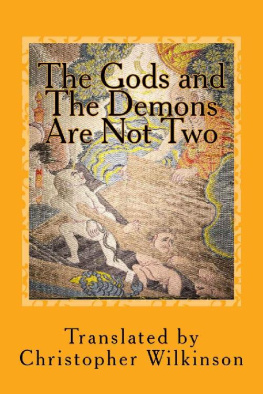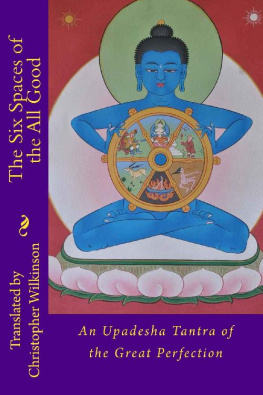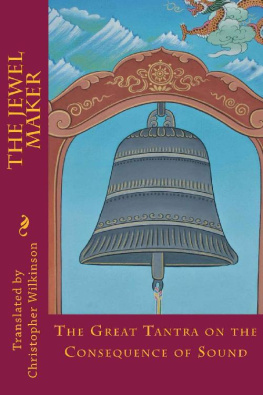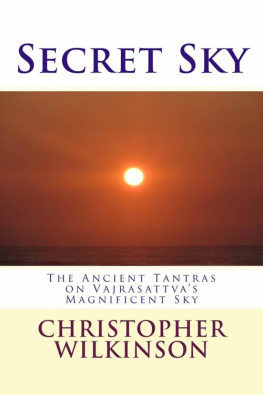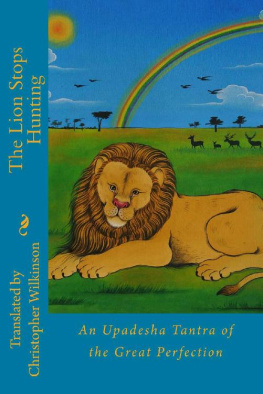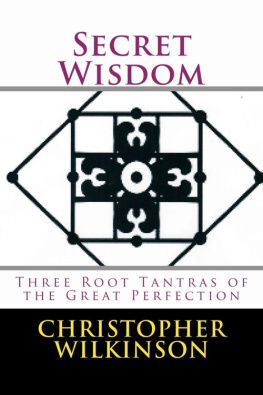Ten Early Tantras of The Great Perfection
A Basket of Diamonds
With Tibetan Text
Translated by
Christopher Wilkinson
Cover photograph of Garuda Ann Shaftel.
No part of this book may be reproduced in any form or by any electronic or mechanical means including information storage and retrieval systems, without permission in writing from the author. The only exception is by a reviewer, who may quote excerpts in a review.
Published by Christopher Wilkinson
Cambridge, MA, USA
Copyright 2016 Christopher Wilkinson
All rights reserved.
ISBN : 1530836603
ISBN-13 : 978-1530836604
DEDICATION
This is for every student and teacher of the Great Perfection.
Also translated by Christopher Wilkinson
Great Perfection Series:
The Gods and the Demons Are Not Two:
A Tantra of the Great Perfection
The Tantra of Great Bliss:
The Guhyagarbha Transmission of Vajrasattvas Magnificent Sky
Secret Sky:
The Ancient Tantras on Vajrasattvas Magnificent Sky
The Great Tantra of Vajrasattva:
Equal to the End of the Sky
Beyond Secret:
The Upadesha of Vairochana on the Practice of the Great Perfection
Secret Wisdom:
Three Root Tantras of the Great Perfection
Sakya Kongma Series:
Sakya Panditas Poetic Wisdom
Jetsun Dragpa Gyaltsan: The Hermit King
Admission at Dharmas Gate by Sonam Tsemo
An Overview of Tantra and Related Works
Chogyal Phagpa: The Emperors Guru
Advice to Kublai Khan: Letters by the Tibetan Monk Chogyal Phagpa to Kublai Khan and his Court
At The Court of Kublai Khan:
Writings of the Tibetan Monk Chogyal Phagpa
CONTENTS
Acknowledgments | vii |
Introduction | ix |
| The Tantra on the Upadea Instructions for the Soaring of the Great Garuda | |
| The Tantra of the Upadea Instructions on the Pounce of the Great Lion | |
| The Tantra of the Upadea Instructions on the Motion of the Geese | |
| The Tantra of the Upadea Instructions on the Song of the Cuckoo of the Awareness | |
| The Tantra on the Upadea Instructions for the Withdrawal of the Golden Turtle | |
| The Fish Lies in Wait: A Drop of the Bodhicitta | |
| The Fish Lies in Wait: The Bodhicitta | |
| The Great Skull-Jump Tantra | |
| The Seven Solid Cuts | |
| The Single Grain of the Black Yangti | |
The Tibetan Texts | |
About the Translator | |
ACKNOWLEDGMENTS
First and foremost, I wish to thank my root teacher Dezhung Rinpoche for constantly bringing out the best in me and encouraging me to pursue a comprehension of every branch of Buddhist learning. It was he who introduced me to Dilgo Kyentse Rinpoche, and through his recommendations enabled me to receive full empowerments, transmissions, and permissions in the areas of Mah, Anu, and Ati Yogas. With the highest regard I wish to thank Dilgo Kyentse Rinpoche, Khetsun Zangpo Rinpoche, Nyoshul Khen Rinpoche, and Khenpo Palden Sherab for their kind instruction and encouragement in my effort to translate the literature of the rDzogs chen. There are many individuals, too many to name here, that have helped me over the years to become a qualified translator, in many ways. At this time I want to remember the kindness of Ngawang Kunga Trinlay Sakyapa, Jigdral Dagchen Sakya Rinpoche, Dhongthog Rinpoche, H.H. Karmapa Rangjung Rigpay Dorje, Kalu Rinpoche, Chogyam Trungpa Rinpoche, Geshe Ngawang Nornang, Carl Potter, David Ruegg, Turrell Wylie, Gene Smith, Karen Lang, Richard Solomon, Jack Hawley, David Jackson, Cyrus Stearns, Herbert Guenther, Eva Neumeier-Dargyay, Leslie Kawamura, Robert Thurman, Paul Nietupski, Lou Lancaster, David Snellgrove, Jean-Luc Achard, Steve Landsberg, Tsultrim Alione, Carolyn Klein, Rob Mayer, Jonathan Silk, David White, Mark Tatz, Steve Goodman, and Kennard Lipman. I want to make special thanks to Marcos Gonzalez Pardo for proofing the manuscript, to Jackson Peterson and his Dzogchen Translation Group as well as to Robert J. Barnhart for their generous support, and to Ann Shaftel for the use of the image of a Garuda for the cover of this book. The many people who have contributed to my understanding and ability to do this work cannot be counted. I wish to thank everyone that has taken a kind interest in these translations, however slight, for your part in making this work a reality.
INTRODUCTION
The Great Perfection, also known as the Atiyoga or Dzogchen ( rDzogs chen ), is both a name for the realization of instantaneous enlightenment and a name for the literature that talks about this. Generally speaking, the Great Perfection is beyond both words and deeds, yet even though nothing may be said about it, there does exist a large body of literature that discusses it. This literature exists today within the canons of teachings that are preserved from the earliest period of Buddhisms beginnings in Tibet, around the Eighth Century of the Common Era. These collections are known as The Hundred Thousand Tantras of the Ancients ( Nyingma Gyubum ). The most famous of the early translators of Great Perfection literature were Vairochana, a Tibetan monk who went to India in search of the teachings on instantaneous enlightenment, and Vimalamitra, an Indian master who came to Tibet. The collected translations of Vairochana are retained in a collection called The Hundred Thousand Tantras of Vairochana ( Vairo Gyubum ).
From out of the many hundreds of titles to be found in these great collections, I have selected ten works that I believe will be of great interest. The first five Tantras in this book are pointing out instructions, or upadea, on the enlightened mind, or Bodhicitta. These five Tantras are a set, and include the Soaring of the Great Garuda, the Pounce of the Great Lion, the Motion of the Geese, the Song of the Cuckoo of the Awareness, and the Withdrawal of the Golden Turtle. These texts are presented in beautiful poetry, which I have done my best to bring through into English. Each contains unique insights into the practice and realization of the Great Perfection.
This set is followed by two Tantras titled The Fish Lies in Wait. The first is a drop of the Bodhicitta, while the second is simply the Bodhicitta. These two works strike at the very core of Great Perfection thinking, and are considered secret.
The practices of the Skull-Jump ( Thod rgal ) and the Solid Cut ( Khregs gcod ) are widely taught by many teachers these days. The Nyingma Gyubum and Vairo Gyubum contain only one text that has Thod rgal in its title: The Great Skull-Jump Tantra. They also contain only one text that has Khregs gcod in its title: The Seven Solid Cuts. These two texts will be of great interest to students who are interested in these practice traditions.
The Single Grain of the Black Yangti contains a very concise and to-the-point description of the very core of the Great Perfection.
All of these titles are found in the Hundred Thousand Tantras of Vairochana, which indicates that the Tibetan translations are believed to be Vairochanas work. Only the two Tantras that share the title The Fish Lies in Wait, however, state this clearly. The first of these two Tantras was explicitly translated by Vairochana with his guru r Singha, while the second represents the collaborative effort of Vairochana with Vimalamitra. With the exception of the Single Grain of the Black Yangti, all of these texts are also found in the mTshams brag manuscript of the Nyingma Gyubum . I have included images of the pages of all these works here, for your convenience and to help to preserve this ancient literature.


